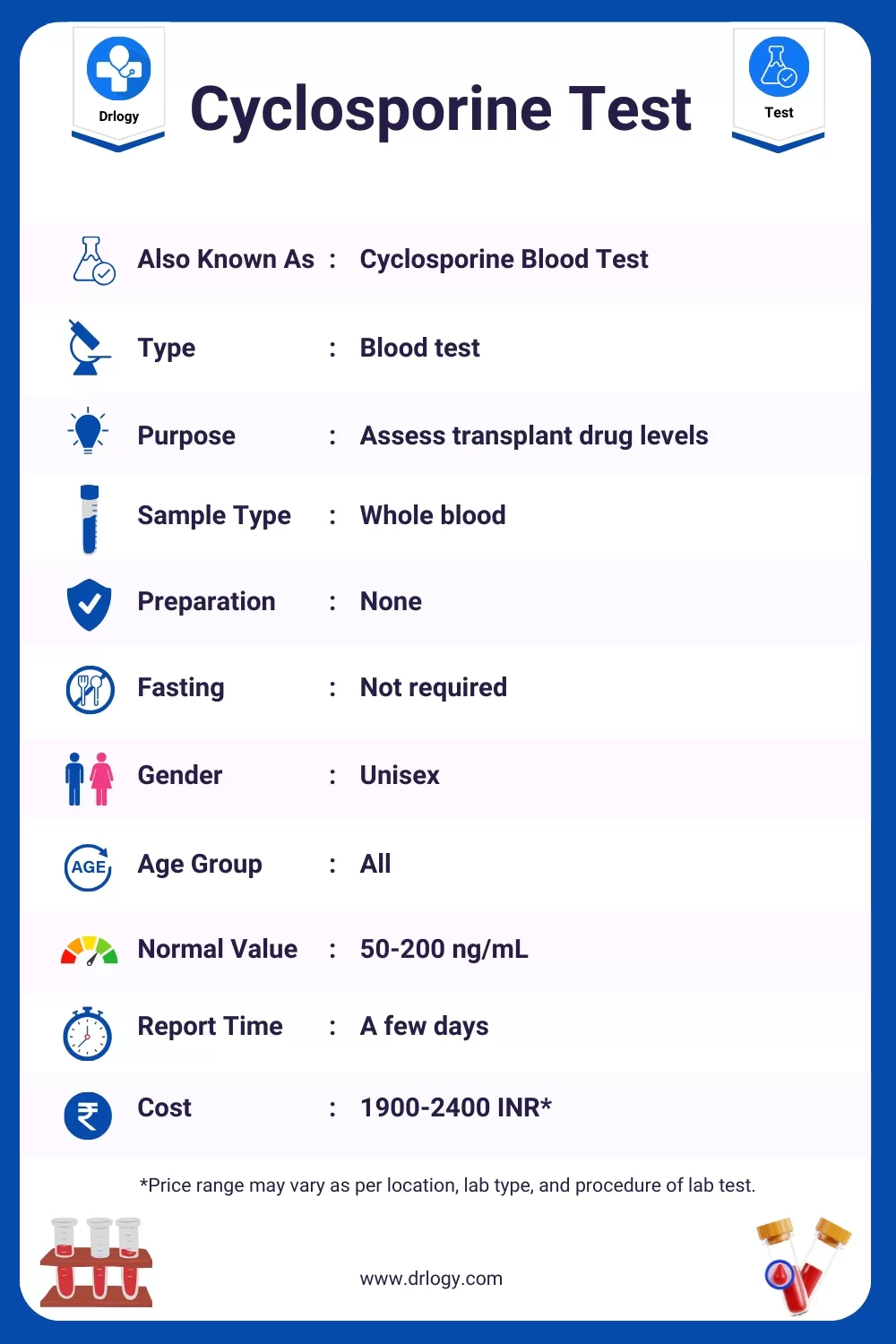
A Cyclosporine test checks Cyclosporine, an immunosuppressant drug levels in your blood. It helps doctors ensure successful organ transplants and treat autoimmune conditions. Learn why it's essential.
Here are the basic details of the Cyclosporine Test.
| Also Known As | Cyclosporine Blood Test |
| Type | Blood test |
| Purpose | Measure drug levels for organ transplant success |
| Sample Type | Whole blood |
| Preparation | None |
| Fasting |
Not required |
| Gender | Unisex |
| Age Group | All |
| Normal Value | 50-200 ng/mL |
| Reporting Time | A few days |
| Cost | 1900-2400 INR* |
*Cyclosporine Test Price range may vary as per location, lab type, and procedure of lab test.
The purpose of the Cyclosporine Test is to:

Here is the basic preparation for the Cyclosporine Test.
Here is the basic Cyclosporine Test Procedure.
Here is the normal range of the Cyclosporine Test.
| Parameter | Normal Range |
|---|---|
| Cyclosporine Level | 50-200 ng/mL |
Here is the Interpretation of the Cyclosporine Test.
| Result (µg/L) | Interpretation |
|---|---|
| Less than 100 | Below therapeutic range |
| 100-200 | Therapeutic range (varies by organ) |
| 201-700 | Above therapeutic range |
| Greater than 700 | Potentially toxic levels |
Here are potential causes of high levels of Cyclosporine Test.
| Possible Causes | Effects |
|---|---|
| Overdose of Cyclosporine | Increased risk of toxic side effects |
| Drug Interactions | Altered metabolism, toxicity, or reduced efficacy |
| Impaired Liver Function | Reduced clearance, elevated levels |
| Renal Dysfunction | Impaired drug elimination, elevated levels |
| Infection or Illness | Altered metabolism, potential toxicity |
Elevated Cyclosporine levels can result from overdosing, drug interactions, or organ dysfunction, potentially leading to toxic effects.
Here are potential causes of low levels of Cyclosporine Test.
| Possible Causes | Effects |
|---|---|
| Poor Medication Adherence | Increased risk of organ rejection or symptom recurrence |
| Drug Interactions | Altered metabolism, reduced drug efficacy |
| Rapid Drug Clearance | Subtherapeutic drug levels, decreased effectiveness |
| Liver Dysfunction | Impaired metabolism, lower drug concentrations |
| Infection or Illness | Altered metabolism, lower therapeutic levels |
Low Cyclosporine levels may result from various factors, including poor adherence, drug interactions, or organ dysfunction, potentially leading to reduced treatment effectiveness.
Here are the specimen requirements for the Cyclosporine Test.
|
Specimen |
Whole blood |
|
|
Volume |
2 mL |
|
|
Container |
Lavender-top (EDTA) tube |
|
|
Storage |
Room temperature |
|
|
Sample Stability |
Temperature |
Period |
|
Room temperature |
14 days |
|
|
Refrigerated |
14 days |
|
|
Frozen |
14 days |
|
|
Freeze/thaw cycles |
Stable x3 |
|
Cyclosporine Test is generally safe when monitored and administered by healthcare professionals.
Here is the basic limitation of Cyclosporine Test.
Here are some of the risk factors of the Cyclosporine Test.
Here are the Doctor's recommendations or consult a specialist after the Cyclosporine Test.
| Cyclosporine Test Result | Doctor to Consult | Reason |
|---|---|---|
| High Levels | Transplant Specialist | Avoid toxicity or organ rejection |
| Normal Levels | Physician | Discuss ongoing treatment |
| Low Levels | Physician | Adjust medication or treatment |
Here are the estimated Cyclosporine Test Prices in India with different top cities:
|
City |
Price Range (INR)* |
|
1900-2400 |
|
|
1950-2400 |
|
|
1900-2400 |
|
|
1950-2400 |
|
|
1900-2400 |
|
|
1950-2400 |
|
|
1900-2400 |
|
|
1950-2400 |
|
|
1950-2400 |
|
|
1900-2400 |
|
|
1950-2400 |
|
|
1900-2400 |
|
|
1950-2400 |
|
|
1900-2400 |
*Cyclosporine Test Price are approximate and vary depending on a specific laboratory or healthcare facility.
Summary
Overall, Cyclosporine test monitor drug levels in blood, crucial for organ transplant success and autoimmune condition management, ensuring safety and efficacy. Also check Drlogy Test for detailed information about all medical tests for patients, doctors, scholers and medical students.
Reference
DOCTOR'S MOST TRUSTED HEALTHCARE PLATFORM
10M+Patients
30000+Doctors
25000+Hospitals/Labs